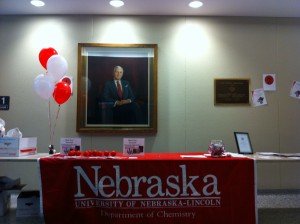
The skills listed are needed in careers in science, libraries, or any area you can name in academia. This post should be considered my unofficial addition to Andy’s great post: Ten Things You Won’t Find on Your LIS Class Syllabus which can likewise apply to most careers in academia.
11) It’s important to be able to say no to others. When you’re new you’ll get a lot of people who need another researcher, committee member, etc. Think very carefully about each request for your time. If you are truly disinterested try and find a nice but firm way of saying no. Research and committee service takes up too much time to do something that you dislike and there are so many opportunities for service that it’s okay to pick and choose what you want to serve on. If you say yes to everything you will be so busy that you can’t get your core job responsibilities done, never mind publish so consider things carefully and say a thoughtful “No.” when appropriate.
12) It’s just as important to be able to say NO to yourself. Once you learn how to say no to others and get in the habit of protecting your time from too many obligations you have to learn to say no to yourself. This is something I really struggle with. For example, I have 8 research projects I’d like to work on right now (4 are related and can be done as separate stages of a larger project). In addition I have another page or so of projects I’d like to explore someday, obviously I can’t do all that so the challenge is picking what to work on now, doing a thorough job, and then moving on to the next project. The problem with things you are really interested and passionate about is that they are so important to you it’s easy to lose perspective and just go for it which can lead to loss of sleep and craziness. One of my solutions to this is to have my boss put a limit on how many projects I can start and when I can start them, that keeps me honest and helps prevent project creep.
13) When you’re new to an institution everything takes longer the first few times. If you’ve ever changed jobs in the same field you’ve experienced this. Every place you work will have slightly different procedures for the same thing, if you’ve never done a task before you have to remember all the instructions without the benefit of previous experience. It takes most of us 5-10 times of repeating the same task to start to feel comfortable with it, So, while you should do your best to learn as quickly as possible cut yourself a little slack if you’re not the fastest worker for your first few months, just keep at it and you’ll get faster over time.
14) Nothing is beneath you. This one really bothers me, things just need to be done if you’re the only one there, or can do it faster than calling someone else just do it. I really don’t get why some people refuse to pitch in just because they make more money than other people. It’s shallow, snobby, and just plain rude. Yes there are some tasks where it makes more sense to have a less highly paid person do them on a regular basis, but when the need is right now I don’t see why we shouldn’t all just pitch in and keep things running. (Yes I realize there are some tasks we aren’t allowed to pitch in on for safety reasons, those aren’t what I’m talking about!)
15) Don’t be overly judgmental of your coworkers. I had a funny conversation with a friend the other day about how all their coworkers seemed to want people to be for or against everyone at work. Firstly, different people have different work styles, just because someone has a different work style doesn’t make them a bad worker. Secondly, the experience of working with someone is often very different from the experience of being someone’s friend. Maybe you don’t want to work directly with someone because your work styles clash but that’s no reason not to get along with them as a person. Lastly, do you really want people judging everything you do? I’ve noticed that many people don’t start actively judging someone unless they feel that person is actively judging them. We are all imperfect, we all mess up, and there’s always ways we can improve.
16) If you are not flexible you will break. This is rather appropriate since I always pull the “be like the willow tree/life is like an ocean” fortune at Shinto Shrines in Japan. The reason sayings like this have been around for a long time is because they are true. In fact, today we are changing faster than any of us can keep up with. Adapt or die! may be a rather provocative way of putting it but you can choose to be flexible or you can choose to dig your heals in. This applies to how you do your job, who you consider credible, job titles, job locations, interacting with others, and just about every aspect of life as an academic librarian. From my perspective it’s the how and the where that evolves, but our purpose as always is to support research, education, and becoming conscientious members of our global society.
17) Everything is not your Dean / Chair / Chancellor / President’s fault. It’s really easy to blame administrators for budget woes, changes in state law that result in budget woes, and cuts in staff. The thing that most of us forget in our outrage is that if we can’t raise tuition then we can’t maintain our current staff, supplies and buildings no matter how hard our leaders fight. Inflation of costs for various products and services per year seem to range from 3%-10+%. In California my health insurance company raised its base rate by about 10% per year, imagine that increase over the costs for an entire university’s worth on employees. Given that, even if you are a given a flat budget for the next year your institution is going to have to make some major cuts to stay financially solvent. The really bad thing about this is that given all the cuts in recent years most of us are well beyond the cutting the fat stage and more in the trying to keep some meat on the bones stage.
18) No one can afford to be a political virgin. I know Andy already mentioned politics in his post, but I can’t emphasize enough how important they are in maintaining and expanding our services. If you’re not an administrator it’s not like you’ll be playing politics all day, but you do need to know who the major players are, what they do, what are hot button topics on your campus, what the library’s stance is on controversial campus issues, and how to be diplomatic when necessary. You can ignore this advice, but you do so at your peril.
19) Having friends at work is key to job satisfaction. You don’t have to be buddy buddy with everyone you work with but there should be at least a couple people you like to share lunch with, or want to invite to a coffee break. Ideally there’ll be at least one person you like hanging out with outside of work too. Part of building a sense of community is interacting with others in a non-project oriented casual setting. If you dislike those around you so much that you don’t want to do any of these things you should already be looking for another job. If you are too busy to eat lunch you have issues. (Yes I know I should be better about taking my lunch on time but I never purposely skip lunch, and I do have lunch with various people several times a month, you know what they say it’s always easier to see your own faults in other people.)
20) Your worth lies in more than just a job description. Often times the most valuable bits of knowledge or skill are ones that don’t directly relate to our job descriptions. It might be our knowledge of aid organizations and how they work, or our interest in art letting you tie in art and technology. Everything that we know will eventually have value as librarians. While we do need specialized knowledge for our positions we shouldn’t be afraid to expand our general knowledge, and to share what you learn with others.

